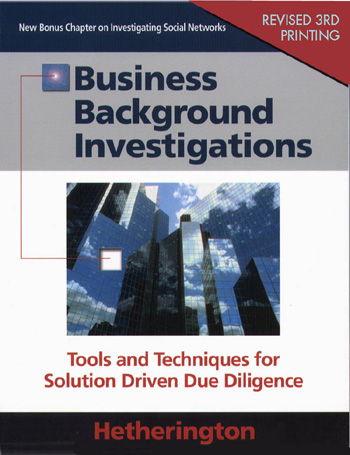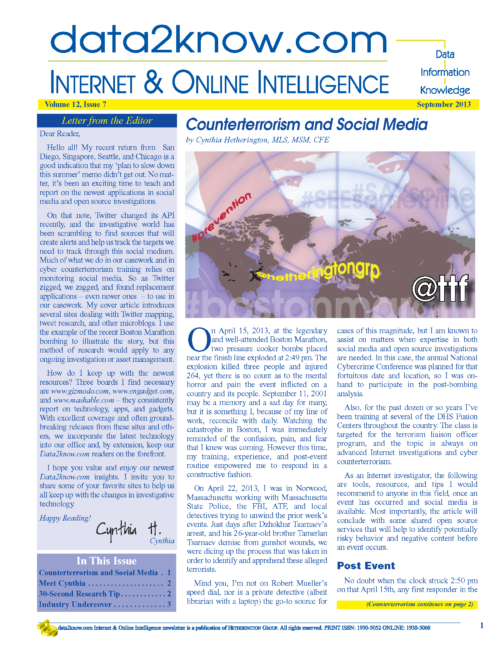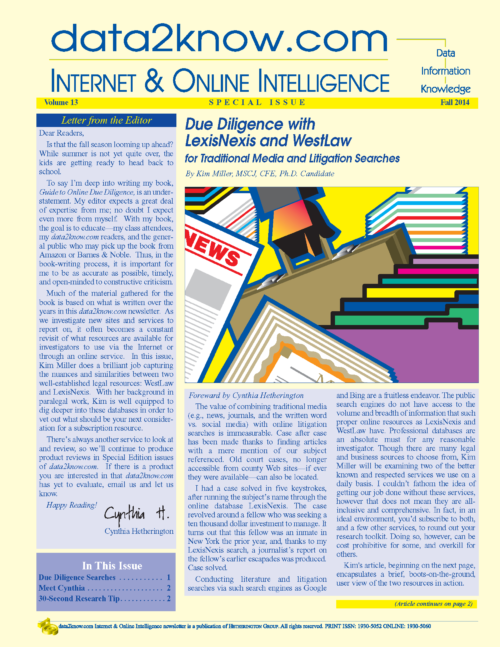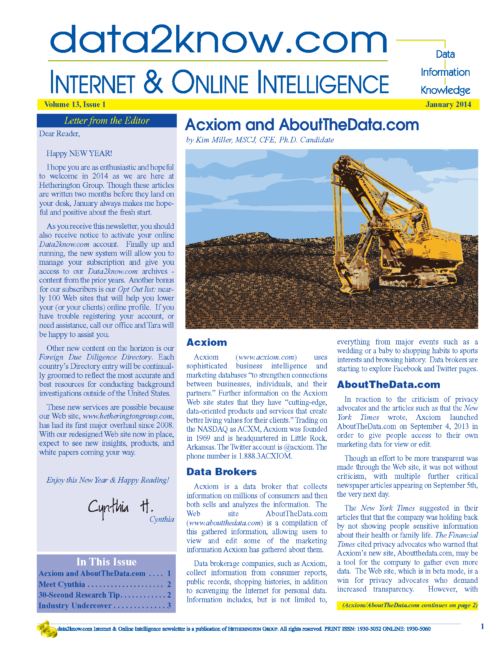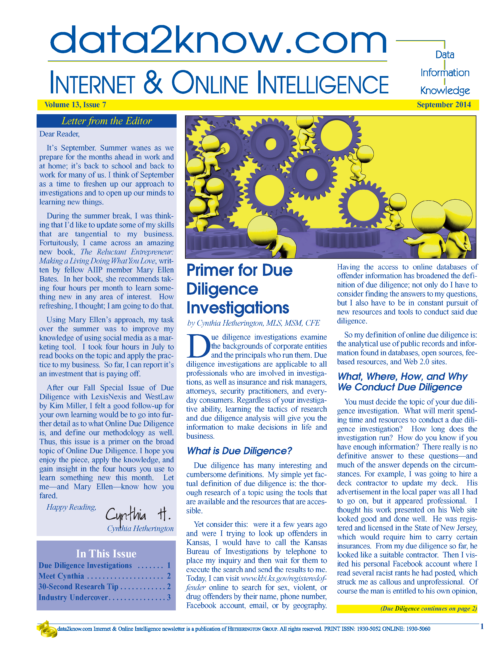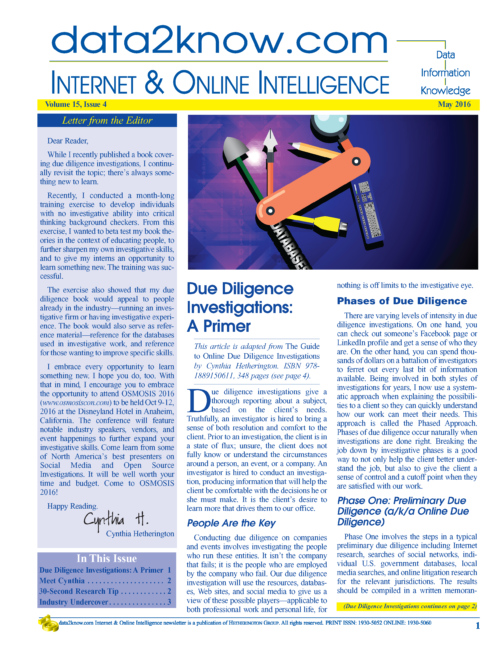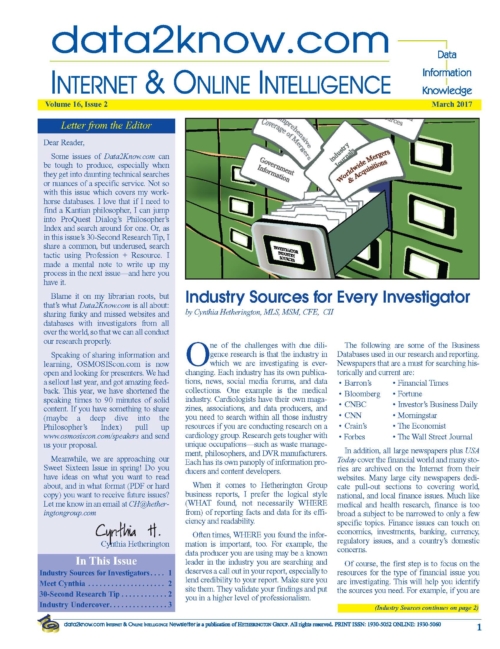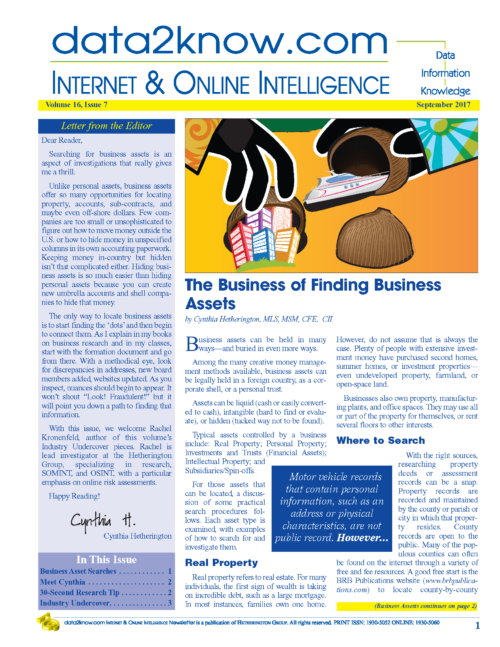-
Data2Know Vol. 12, No. 7
$15.00Counterterrorism and Social Media
As an Internet investigator, the following are tools, resources, and tips I would recommend to anyone in this field, once an event has occurred and social media is available. Most importantly, the article will conclude with some shared open source services that will help to identify potentially risky behavior and negative content before an event occurs. -
Due Diligence with LexisNexis and WestLaw
The value of combining traditional media (e.g., news, journals, and the written word vs. social media) with online litigation searches is immeasurable. Case after case has been made thanks to finding articles with a mere mention of our subject referenced. Old court cases, no longer accessible from county Web sites—if ever they were available—can also be located. -
Data2Know Vol. 13, No. 1
$15.00Acxiom and AboutTheData.com
Acxiom uses sophisticated business intelligence and marketing databases "to strengthen connections between businesses, individuals, and their partners." Further information on the Acxiom Web site states that they have "cutting-edge, data-oriented products and services that create better living values for their clients" -
Data2Know Vol. 13, No. 7
$15.00Primer for Due Diligence Investigations
Primer for Due Diligence Investigations will explain what due diligence is and how online due diligence can accomplish much with very little. We outline the phases of conducting proper research and the necessary skill sets that are indispensable for this work. -
Data2Know Vol. 15, No. 4
$15.00Due Diligence Investigations: A Primer
Due diligence investigations give a thorough reporting about a subject, based on the client’s needs. Truthfully, an investigator is hired to bring a sense of both resolution and comfort to the client. Prior to an investigation, the client is in a state of flux; unsure, the client does not fully know or understand the circumstances around a person, an event, or a company. An investigator is hired to conduct an investigation, producing information that will help the client be comfortable with the decisions he or she must make. It is the client’s desire to learn more that drives them to our office. -
Data2Know Vol. 16 No. 2
$15.00Industry Sources for Every Investigator
One of the challenges with due diligence research is that the industry in which we are investigating is ever-changing. Each industry has its own publications, news, social media forums, and data collections. One example is the medical industry. Cardiologists have their own magazines, associations, and data producers, and you need to search within all those industry resources if you are conducting research on a cardiology group. Research gets tougher with unique occupations—such as waste management, philosophers, and DVR manufacturers. Each has its own panoply of information producers. This article focuses on the WHERE to find information, rather than the always important WHAT. -
Data2Know Vol. 16, No. 7
$15.00The Business of Finding Business Assets Business assets can be held in many ways—and buried in even more ways. Among the many creative money management methods available, business assets can be legally held in a foreign country, as a corporate shell, or a personal trust. Assets can be liquid (cash or easily converted to cash), intangible (hard to find or evaluate), or hidden (tucked way not to be found). Typical assets controlled by a business include: Real Property; Personal Property; Investments and Trusts (Financial Assets); Intellectual Property; and Subsidiaries/Spin-offs. For those assets that can be located, a discussion of some practical search procedures follows. Each asset type is examined, with examples of how to search for and investigate them. what you pay for. -
Data2Know Vol. 17 No. 1
$15.00Searching For Videos & Images On The Internet
In this issue of Data2Know.com, we have guest contributing author and OsInt officer Janiece Mondale providing us with two articles of her Open source news content. Of the many articles Ms. Mondale has authored, these pieces collate best practices for online intelligence professionals to conquer the overwhelming amount of content on the internet.

